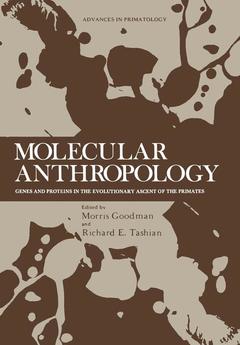Molecular Anthropology, 1976 Genes and Proteins in the Evolutionary Ascent of the Primates Advances in Primatology Series
Langue : Anglais
Coordonnateur : Goodman Morris

In 1962 at the Burg Wartenstein Symposium on "Classification and Human Evolution," Emile Zuckerkandl used the term "molecular anthropology" to characterize the study of primate phylogeny and human evolution through the genetic information contained in proteins and polynucleotides. Since that time, our knowledge of molecular evolution in primates and other organisms has grown considerably. The present volume examines this knowledge especially as it relates to the phyletic position of Homo sapiens in the order Primates and to the trends which shaped the direction of human evolution. Participants from the disciplines of protein and nucleotide chemistry, genetics, statistics, paleon tology, and physical anthropology held cross-disciplinary discussions and argued some of the major issues of molecular anthropology and the data upon which these arguments rest. Chief among these were the molecular clock controversy in hominoid evolution; the molecular evidence on phylogenetic relationships among primates; the evolution of gene expression regulation in primates; the relationship of fossil and molecular data in the Anthropoidea and other pri mates; the interpretation of the adaptive significance of evolutionary changes; and, finally, the impact on mankind of studies in molecular anthropology. Most of the papers in this volume were presented in a preliminary form at Symposium No. 65 on "Progress in Molecular Anthropology" held at Burg Wartenstein, Austria, from July 25 to August 1, 1975. These papers were subsequently revised and some additional papers related to the theme of the symposium were also contributed to this volume.
I. Background to Some Key Issues.- 1 What Is Molecular Anthropology?.- 2 Mutation and Molecular Evolution.- 3 The Fossil Record of Primate Phylogeny.- 4 Splitting Times among Hominoids Deduced from the Fossil Record.- II. Molecular Evolution as Interpreted by Mathematical Models.- 5 Information Theory, Molecular Evolution, and the Concepts of von Neumann.- 6 Random and Nonrandom Processes in the Molecular Evolution of Higher Organisms.- 7 Proof for the Maximum Parsimony (“Red King”) Algorithm.- III. Primate Phylogeny and the Molecular Clock Controversy.- 8 Molecular Systematics of the Primates.- 9 Immunodiffusion Evidence on the Phylogeny of the Primates.- 10 Evolutionary Rates in Proteins: Neutral Mutations and the Molecular Clock.- IV. Primate Evolution Inferred from Amino Acid Sequence Data.- 11 Evolution of the Primary Structures of Primate and Other Vertebrate Hemoglobins.- 12 The Hemoglobins of Tarsius bancanus.- 13 Old World Monkey Hemoglobins: Deciphering Phylogeny from ComplexPatterns of Molecular Evolution.- 14 Structure and Function of Baboon Hemoglobins.- 15 Evolution of Myoglobin Amino Acid Sequences in Primates and Other Vertebrates.- 16 Evolution of Carbonic Anhydrase in Primates and Other Mammals.- 17 Toward a Genealogical Description of the Primates.- V. Multigene Families and Genetic Regulation in the Evolution of Man.- 18 Comparative Aspects of DNA in Higher Primates.- 19 Evolutionary Origin of Antibody Specificity.- 20 Programs of Gene Action and Progressive Evolution.
Date de parution : 07-2013
Ouvrage de 466 p.
17.8x25.4 cm
Thème de Molecular Anthropology :
Mots-clés :
anthropology; evolution; human evolution; molecular evolution; phylogeny; primates
© 2024 LAVOISIER S.A.S.


